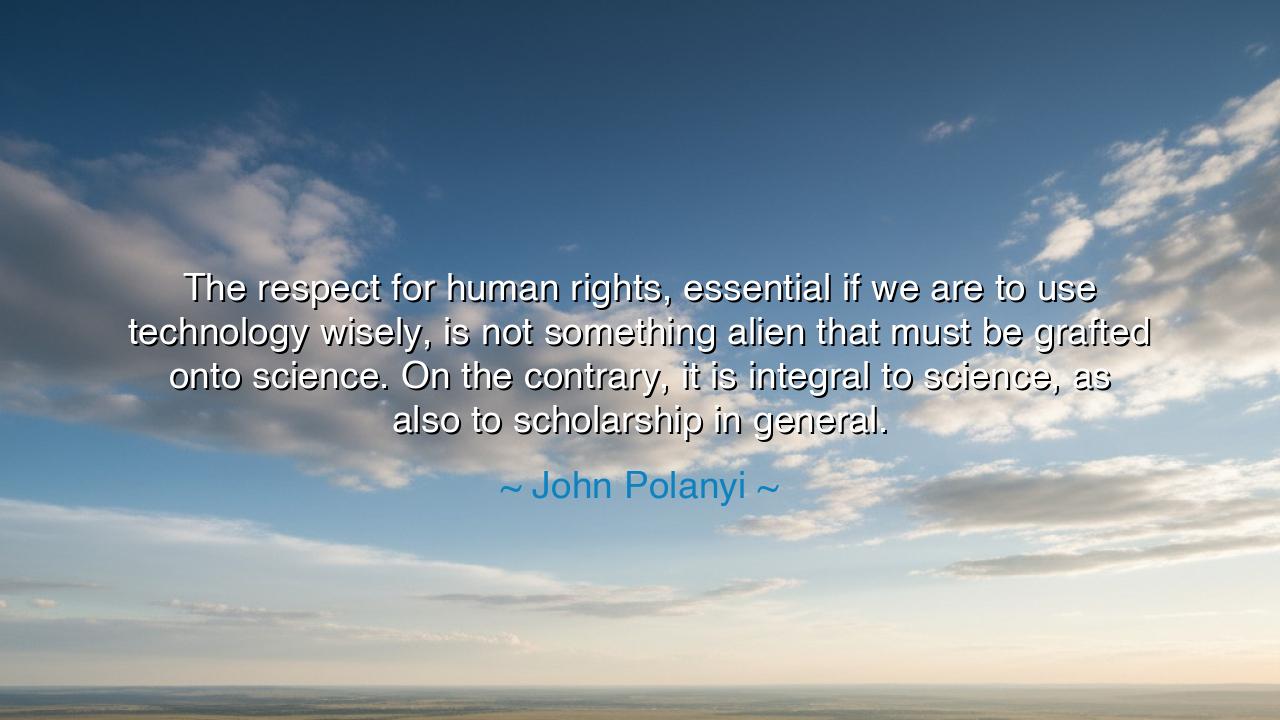
The respect for human rights, essential if we are to use
The respect for human rights, essential if we are to use technology wisely, is not something alien that must be grafted onto science. On the contrary, it is integral to science, as also to scholarship in general.






The words of John Polanyi, “The respect for human rights, essential if we are to use technology wisely, is not something alien that must be grafted onto science. On the contrary, it is integral to science, as also to scholarship in general,” resonate with the solemnity of ancient wisdom. He reminds us that ethics and human dignity are not external adornments, but the very foundation of knowledge itself. To pursue science or scholarship without reverence for human life and rights is to wander blind, wielding great power without direction or purpose. True wisdom lies in the union of intellect and conscience, discovery and compassion.
The origin of this insight flows from Polanyi’s own life as a chemist, scholar, and Nobel laureate, who witnessed the profound capacity of technology to transform the world, for good and ill. From atomic energy to genetic research, the tools of science can heal or harm, liberate or enslave. Polanyi recognized that unless scientists rooted their work in respect for human rights, the fruits of intellect might become instruments of oppression rather than progress. He called for a vision in which knowledge and morality rise together, inseparable as twin stars guiding humanity.
History provides a stark illustration. Consider the development of nuclear energy during the twentieth century. The same science that illuminated the atom also wrought destruction in Hiroshima and Nagasaki. Those who worked without integrating respect for human life into their calculations discovered too late that power without conscience becomes a weapon. Polanyi’s words echo in that tragedy: technology alone is neutral, but the ethical heart behind its use is what determines whether it uplifts or devastates.
Even earlier, the dark chapters of medical experimentation reveal the peril of divorcing scholarship from humanity. The experiments conducted on prisoners during the Second World War serve as grim testimony: the pursuit of scientific knowledge, when untethered from human rights, can become monstrous. It is only when respect for persons guides inquiry that discovery becomes noble. Polanyi’s wisdom reminds us that ethics is not optional, but integral—woven into the very DNA of meaningful scholarship.
Yet his teaching is not a condemnation of science, but a celebration of its highest potential. When scholars honor human dignity, when technologists wield their tools with conscience, the results are transformative. From the eradication of smallpox to the creation of life-saving vaccines, science guided by morality can alleviate suffering and enhance the human condition. The lesson is that wisdom and knowledge are inseparable: one must cultivate both the mind and the heart to shape a future worthy of posterity.
The practical lesson for us is profound. If you are a seeker of knowledge, integrate ethics into every experiment, every calculation, every pursuit. Ask: Does this serve humanity? Does this honor the dignity of every individual? When making decisions about technology or scholarship, weigh not only what is possible, but what is just, what respects the rights and welfare of others. Polanyi teaches that morality is not a burden on science—it is its guiding light.
Practical action flows naturally from this principle. Scholars and innovators should establish ethical frameworks, consult with peers, and engage with the communities affected by their work. Teachers should cultivate not only intellect but also conscience in their students. And each individual, whether in laboratories, classrooms, or daily life, must remember that knowledge without morality is a sword without a hand to wield it wisely.
Thus, let John Polanyi’s words echo across the generations: respect for human rights is integral to science and scholarship. To build a future where technology serves humanity, we must entwine our pursuit of discovery with the inviolable dignity of all people. Only then does progress become true enlightenment, and only then does knowledge become a blessing rather than a burden upon the world.






AAdministratorAdministrator
Welcome, honored guests. Please leave a comment, we will respond soon